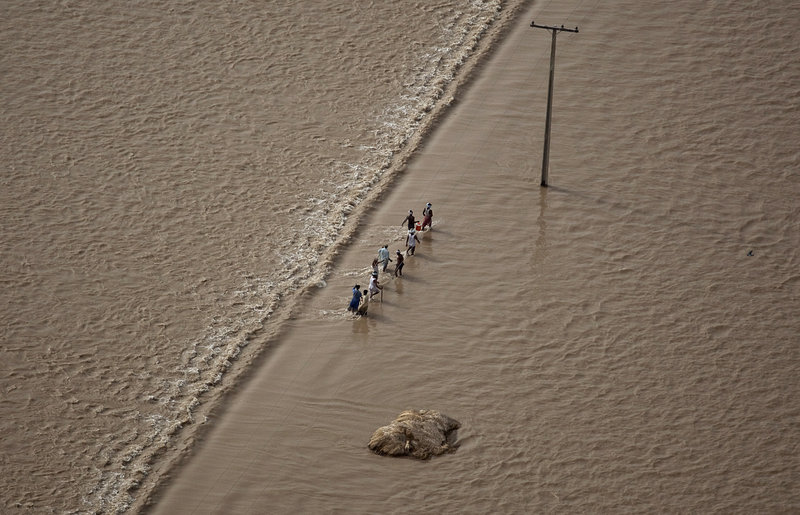ISLAMABAD — About 800,000 people have been cut off by floods in Pakistan and are only reachable by air, the United Nations said Tuesday. It needs at least 40 more helicopters to ferry lifesaving aid to increasingly desperate people, the U.N. said.
The appeal was an indication of the massive problems facing the relief effort in Pakistan more than three weeks after the floods hit the country, affecting more than 17 million people and raising concerns about possible social unrest and political instability.
“These unprecedented floods pose unprecedented logistical challenges, and this requires an extraordinary effort by the international community,” said John Holmes, U.N. under-secretary general for humanitarian affairs.
Earlier, Prime Minister Yousuf Raza Gilani said hundreds of health facilities had been damaged and tens of thousands of medical workers displaced. And the country’s chief meteorologist warned that it would be two weeks until the Indus River — the focus of the flooding still sweeping through the country – returns to normal levels.
The floods began with hammering monsoon rains in the northwest and have swept southward. Many of those cut off are in the mountainous northwest, where roads and bridges have been swept away.
The United States has deployed at least 18 helicopters that are flying regular relief missions, but the U.N. said it would need at least 40 more heavy-lift choppers working at full capacity to reach the estimated 800,000 stranded in the country.
The U.N. High Commissioner for Refugees estimates that about 700,000 Pakistanis have been forced into makeshift settlements just in the southern province of Sindh.
Although there have been no major disease outbreaks because of the floods, aid agencies are increasingly worried, saying contaminated water and a lack of proper sanitation were already causing a spike in medical problems in camps for the displaced.
“Pakistan and its people are experiencing the worst natural calamity of its history,” Gilani said at a meeting on health issues in the flood zone. “As human misery continues to mount, we are seriously concerned with spread of epidemic diseases.”
More than 3.5 million children are at risk from waterborne diseases, he said, and skin diseases, respiratory infections and malnutrition are spreading in flooded areas.
Dr. Jahanzeb Orakzai, Pakistan’s national health coordinator, said a team has been formed to oversee the response to any flood-related health emergencies.
“Health problems usually arise in flood-affected areas after four to six weeks, and we need to be alert and prepared to tackle the situation,” he said.
Local charities, the Pakistani army and international agencies are providing food, water, medicine and shelter to the displaced, but millions have received little or no help.
Copy the Story Link
Send questions/comments to the editors.



Success. Please wait for the page to reload. If the page does not reload within 5 seconds, please refresh the page.
Enter your email and password to access comments.
Hi, to comment on stories you must . This profile is in addition to your subscription and website login.
Already have a commenting profile? .
Invalid username/password.
Please check your email to confirm and complete your registration.
Only subscribers are eligible to post comments. Please subscribe or login first for digital access. Here’s why.
Use the form below to reset your password. When you've submitted your account email, we will send an email with a reset code.